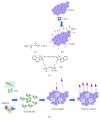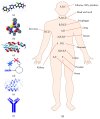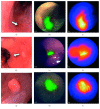Targeted Optical Imaging Agents in Cancer: Focus on Clinical Applications
- PMID: 30224903
- PMCID: PMC6129851
- DOI: 10.1155/2018/2015237
Targeted Optical Imaging Agents in Cancer: Focus on Clinical Applications
Abstract
Molecular imaging is an emerging strategy for in vivo visualization of cancer over time based on biological mechanisms of disease activity. Optical imaging methods offer a number of advantages for real-time cancer detection, particularly in the epithelium of hollow organs and ducts, by using a broad spectral range of light that spans from visible to near-infrared. Targeted ligands are being developed for improved molecular specificity. These platforms include small molecule, peptide, affibody, activatable probes, lectin, and antibody. Fluorescence labeling is used to provide high image contrast. This emerging methodology is clinically useful for early cancer detection by identifying and localizing suspicious lesions that may not otherwise be seen and serves as a guide for tissue biopsy and surgical resection. Visualizing molecular expression patterns may also be useful to determine the best choice of therapy and to monitor efficacy. A number of these imaging agents are overcoming key challenges for clinical translation and are being validated in vivo for a wide range of human cancers.
Figures









References
-
- American Cancer Society. Cancer Facts and Figures. Atlanta, GA, USA: American Cancer Society; 2017.
-
- Bray F., Jemal A., Grey N., Ferlay J., Forman D. Global cancer transitions according to the human development Index (2008–2030): a population-based study. The Lancet Oncology. 2012;13(8):790–801. - PubMed
-
- National Cancer Institute. Surveillance, Epidemiology, and End Results (SEER) Program Research Data (1973-2014), DCCPS, Surveillance Research Program, released April 2017, based on the November 2016 Submission. Rockville, MD, USA: National Cancer Institute; 2017. http://www.seer.cancer.gov.
-
- Howlader N., Noone A. M., Krapcho M., et al. SEER Cancer Statistics Review, 1975–2013. Bethesda, MD, USA: National Cancer Institute; 2016.
Publication types
MeSH terms
Substances
Grants and funding
LinkOut - more resources
Full Text Sources
Other Literature Sources
